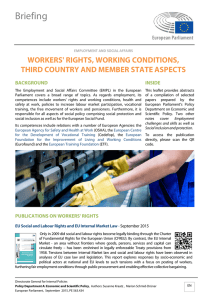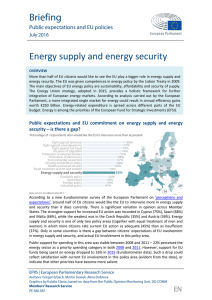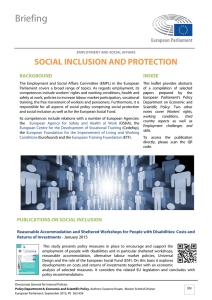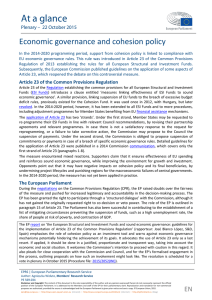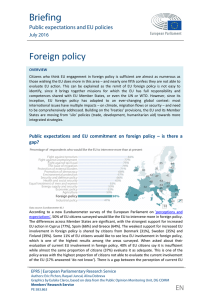EPRS - European Parliament
Anuncio
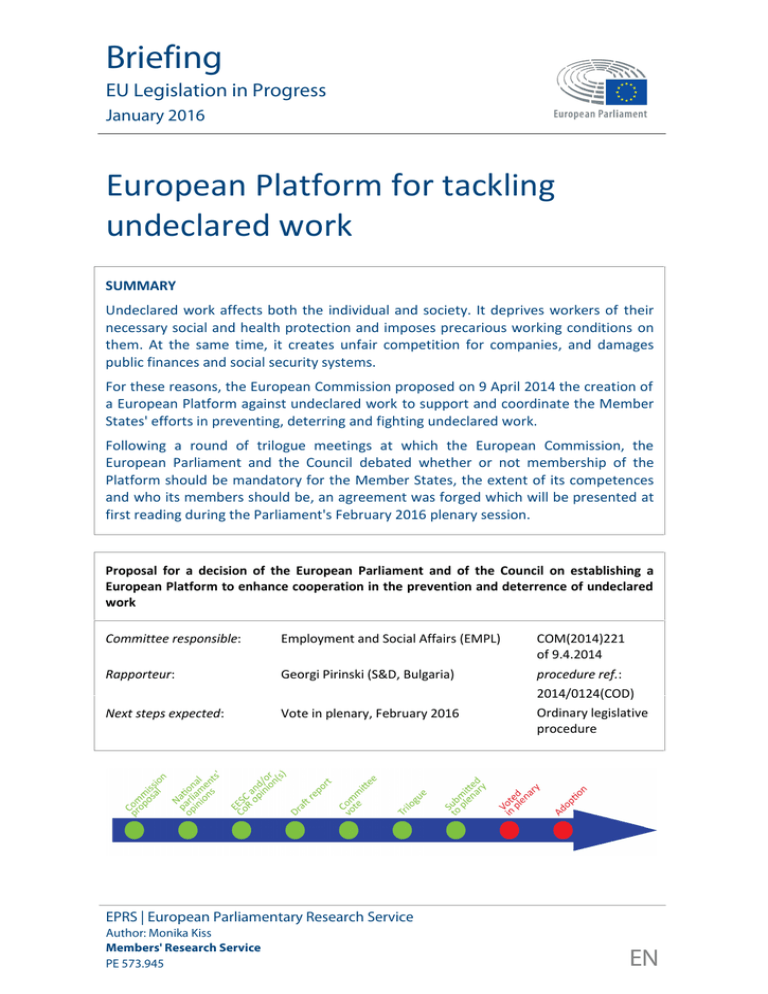
Briefing
EU Legislation in Progress
January 2016
European Platform for tackling
undeclared work
SUMMARY
Undeclared work affects both the individual and society. It deprives workers of their
necessary social and health protection and imposes precarious working conditions on
them. At the same time, it creates unfair competition for companies, and damages
public finances and social security systems.
For these reasons, the European Commission proposed on 9 April 2014 the creation of
a European Platform against undeclared work to support and coordinate the Member
States' efforts in preventing, deterring and fighting undeclared work.
Following a round of trilogue meetings at which the European Commission, the
European Parliament and the Council debated whether or not membership of the
Platform should be mandatory for the Member States, the extent of its competences
and who its members should be, an agreement was forged which will be presented at
first reading during the Parliament's February 2016 plenary session.
Proposal for a decision of the European Parliament and of the Council on establishing a
European Platform to enhance cooperation in the prevention and deterrence of undeclared
work
Committee responsible:
Employment and Social Affairs (EMPL)
Rapporteur:
Georgi Pirinski (S&D, Bulgaria)
Next steps expected:
Vote in plenary, February 2016
COM(2014)221
of 9.4.2014
procedure ref.:
2014/0124(COD)
Ordinary legislative
procedure
EPRS | European Parliamentary Research Service
Author: Monika Kiss
Members' Research Service
PE 573.945
EN
EPRS
European Platform for tackling undeclared work
In this briefing:
Introduction
Context
Existing situation
The changes the proposal would bring
Preparation of the proposal
Parliament's starting position
Stakeholders' views
Advisory committees
Council
National parliaments
Parliamentary analysis
Legislative process
References
Introduction
On 9 April 2014, the European Commission adopted a proposal on the creation of a
European Platform against undeclared work. Undeclared work has serious budgetary
implications through decreased tax and social security revenues. It has harmful impacts
on employment, productivity, compliance with standards for working conditions, skills
development and life-long learning. It undermines the financial sustainability of social
protection systems, deprives workers of adequate social benefits and results in lower
pension rights and reduced access to healthcare.
The aim of the proposal was to improve cooperation at EU level in order to prevent and
deter undeclared work more effectively. The planned European Platform was envisaged
as a network of enforcement bodies involved in the fight against undeclared work. The
legal basis of the proposal was Article 153(2)(a) of the Treaty on the Functioning of the
European Union (TFEU).1
Context
The European Commission defines undeclared work as 'paid activities that are lawful as
regards their nature but not declared to public authorities, taking into account
differences in the regulatory system of Member States'. This definition links undeclared
work with tax and/or social security fraud and covers diverse activities, ranging from
informal household services to clandestine work by illegal residents, but excludes
criminal activities. Undeclared work is influenced by a wide range of economic, social
and country-specific factors, making it difficult to quantify the problem at EU level.
Undeclared work exists not only at national but also at cross-border level. The most
vulnerable groups, such as migrants, elderly people and low-skilled workers are often
widely represented in sectors affected by undeclared work.
A specific form of undeclared work is the abuse of self-employed status, also known as
'bogus self-employment', either at national level or in cross-border situations. This
occurs when a person fulfilling the conditions characteristic of an employment
relationship is nonetheless declared to be self-employed in order to avoid certain legal
or fiscal obligations. It is therefore falsely declared work.
The undeclared economy of the EU is considerable in size, estimated at over 18% of
GDP. However, it varies significantly across Member States, ranging from below 8% to
over 30% of GDP. A 2013 Eurobarometer survey2 carried out in the 28 Member States
shows that 11% of respondents had bought goods or services involving undeclared work
the previous year, while 4% had carried out undeclared paid activities themselves.
Undeclared goods and services most frequently mentioned in the survey were home
repairs or renovations (29%), car repairs (22%), home cleaning (15%), buying food
(12%). Less frequently mentioned were healthcare services (8%) and baby-sitting (5%).3
Members' Research Service
Page 2 of 9
EPRS
European Platform for tackling undeclared work
Furthermore, 3% of respondents reported being paid partly in cash by their employer
('envelope wages'). The Commission's 2013 Employment and Social Developments in
Europe (ESDE) review provides further analysis of these findings.4 Compared with the
findings in a survey on undeclared work from 2007, it may be seen that although the
overall extent of undeclared work appears rather stable, there are some distinct
country-specific developments.5 According to Eurofound, there is a clear north-south
and east-west divide within the EU. Nevertheless, the ESDE says that incentives to
formalise undeclared activities (administrative simplification, direct tax incentives for
buyers, and service vouchers); measures to foster 'tax morality' (for example through
awareness-raising campaigns); and better detection and tougher sanctions have
contributed to combatting undeclared work in different Member States.
Existing situation
The main responsibility for tackling undeclared work lies with the Member States, in the
hands of by three types of enforcement bodies, namely labour inspectorates, social
security inspectorates and tax authorities. They collect and match data, perform
workplace inspections and impose sanctions. They also have a role to play in enabling
compliance, for example through awareness-raising campaigns and citizen hotlines for
reporting cases of undeclared work. Deterrence, which seeks to bring about compliance
by detecting and penalising non-compliance, remains the dominant approach across the
majority of Member States. A more holistic approach representing a balanced mix of
prevention and enforcement, with involvement of the social partners, is still largely
missing. A proposal for adopting such an approach was put forward in the Commission's
1998 communication on undeclared work, the Council's Decision on the employment
guidelines for 2003-2005, and again in the Council's 2003 Resolution on undeclared work.
On 24 October 2007, the Commission published a communication entitled 'Stepping up
the fight against undeclared work'. In that, it reiterated that despite some progress in
combatting undeclared work, there was still a need for a balanced policy, involving
measures such as: reducing the financial attractiveness of undeclared work;
administrative reform and simplification; strengthening the surveillance and sanction
mechanisms; trans-national cooperation between Member States; and awarenessraising activities.
The Commission's April 2012 Employment package formulated the basis of the current
proposal, underlining that transforming informal or undeclared work into regular
employment could help reduce unemployment, and highlighting the need for improved
cooperation between Member States.
The Commission's 2012 communication, 'Towards a job-rich recovery', drew attention
to the need for improved cooperation among Member States and announced the
launch of consultations on the establishment of an EU-level platform between labour
inspectorates and other enforcement bodies, to combat undeclared work by improving
cooperation, sharing best practices and identifying common principles for inspection.
The need for structured cooperation with existing labour associations – the Senior
Labour Inspectors Committee (SLIC), which is the closest in concept to the Platform, as
well as the Working Group on Administrative Cooperation in the Field of Direct
Taxation, the Expert Committee on the Posting of Workers and the Administrative
Commission for Social Security Coordination – was also stressed.
Members' Research Service
Page 3 of 9
EPRS
European Platform for tackling undeclared work
The changes the proposal would bring
The proposal for a decision states that it is primarily incumbent on the Member States
to combat undeclared work. Given that they face similar challenges and that undeclared
work sometimes has a cross-border dimension, action at EU level could play an
important role by reinforcing cooperation between national enforcement authorities.
Currently, there is no common formal mechanism, valid for all Member States, to
address the economic, fiscal and social problems related to undeclared work. The
Commission proposal's ambition is to create such a mechanism.
The Impact Assessment accompanying the Commission proposal presents different
options for enhancing EU cooperation in the prevention and deterrence of undeclared
work. It concludes that the best option would be a European Platform with mandatory
membership for Member States.
The task of the Platform would be to develop EU-wide cooperation in the prevention
and deterrence of undeclared work, and as a result, to favour the emergence of legal
jobs. In order to realise these objectives, it would improve enforcement authorities'
technical capacity to tackle cross-border issues, and increase public awareness on the
need for action. The draft decision establishes a list of tasks the Platform could carry out
(amongst others establishment of a knowledge bank of different practices and
measures; adoption of guidelines and common principles for inspectors, and a
handbook of good practices; development of permanent training capacity for
enforcement authorities; and implementation of peer reviews to follow Member States'
progress). The platform will be composed of senior representatives nominated by the
Member States, a maximum of four representatives of the EU-level cross-industry social
partners, split equally between workers' and employers' organisations (with no voting
rights) and the Commission. Member States would each establish a single point of
contact, whilst the Commission would coordinate the Platform and chair its meetings.
To carry out its tasks, the Platform would agree two-year work programmes, and set up
working groups to deal with specific issues related to undeclared work. The Commission
would submit a report four years after the Platform becomes operational and assess
progress towards its objectives. The Platform would be funded by the Programme for
Employment and Social Innovation (EaSI), (with an indicative amount of €2.1 million per
year) and the European Social Fund (ESF).
Preparation of the proposal
As announced in its 2012 communication, the Commission carried out a first-stage
consultation in mid-2013 with EU-level representatives of employers and employees on
possible future EU measures to increase cooperation between national enforcement
authorities. This was followed by a second-stage consultation at the beginning of 2014.
According to the results which were incorporated in the impact assessment
accompanying the Commission proposal, the majority of those consulted considered
the taking of additional EU-level action to be justified.
Parliament's starting position
Parliament has endorsed initiatives to fight undeclared work for a number of years.
A 2007 resolution on the Commission's Green Paper on labour law 'Modernising labour
law to meet the challenges of the 21st century' identified action against undeclared
work as one of the priorities for labour law reform within the Member States.
Members' Research Service
Page 4 of 9
EPRS
European Platform for tackling undeclared work
Following that Green Paper, in 2008 Parliament adopted an own-initiative resolution on
'Stepping up the fight against undeclared work' tabled by the Committee on
Employment and Social Affairs. This report called for a renewed fight against undeclared
work and the underground economy, through a comprehensive and balanced approach
of prevention, monitoring, law enforcement and sanctions. Concerns about the extent
of undeclared work (20% or more of EU GDP) were identified as a key issue. Parliament
encouraged Member States and the social and economic stakeholders to come to an
agreement which would allow undeclared activities to move gradually to the sphere of
legal activity (for instance, through voucher systems).
On 14 January 2014, Parliament adopted an own-initiative resolution 'Effective labour
inspections as a strategy to improve working conditions in Europe' (rapporteur Jutta
Steinruck, S&D, Germany), which called for stronger cooperation and reinforcement of
national labour inspectorates to fight undeclared work. Parliament called on national
labour inspectorates to draw up action plans to combat undeclared work, covering all
forms of abuse pertaining to employment and self-employment. More efficient
cross-border exchanges of information and early warning systems were also mentioned
as crucial issues in this context.
Stakeholders' views
According to the Commission’s first and second stage of consultations with the social
partners (July to October 2013, and January to March 2014), the majority of
stakeholders consider that additional action at EU level is justified. However, most
employers' organisations (for example, the European Construction Industry Federation
(FIEC), the Confederation of European Business (BusinessEurope) and the European
Centre of Employers and Enterprises providing Public Services (CEEP)) do not support
the creation of a separate structure, but recommend better coordination of existing
groups.
In their joint letter of 20 April 2015, the European social partners representing the
agriculture, cleaning, construction, hotels, restaurants and catering and security services
sectors welcomed the proposal to establish the platform but expressed concern over
the lack of clarity on how participants would be selected and what their roles would be.
They were keen to ensure that their own sectors would be actively involved in the
Platform.
The European Association for Paritarian Institutions (AEIP) suggested a series of
amendments to the Commission proposal in April 2015. Among these were for the
Platform to deal also with falsely declared work, and that with regard to undeclared
work, the term 'fight' should be used instead of 'deterrence'. Furthermore, all national
stakeholders should be involved in the work of the Platform, and the Platform should
not restrict national standards and Member States' competences in dealing with
undeclared work.
Advisory committees
The European Economic and Social Committee (EESC) gave its opinion on the
Commission proposal on 10 September 2014. The EESC considers that it is right to
include bogus self-employment among the forms of undeclared work; however, there is
a need for an exact definition of this phenomenon. While fully agreeing with the
functions and tasks of the Platform, the EESC believes that its duties could be expanded
Members' Research Service
Page 5 of 9
EPRS
European Platform for tackling undeclared work
to include the possibility of making recommendations on legislation at EU or Member
State level. Member States should ensure the mandatory involvement of the social
partners and civil society organisations that play a decisive role in national-level actions
to combat undeclared work.
The Committee of the Regions (CoR) adopted an opinion on the Commission proposal
on 7 October 2014, in which it pointed out that making participation in the Platform
mandatory for Member States is against the principle of subsidiarity. The CoR also
stated that it would be useful to draw on the knowledge and experience of local and
regional authorities, given that they work with a wide range of local players and have
knowledge and first-hand experience with regard to the shadow economy at local and
regional level. The CoR therefore insisted on gaining observer status in the work of the
Platform.
Council
In accordance with Article 148 TFEU, Council Decision 2010/707/EU adopted guidelines
to assist Member States in defining their national programmes for reforming their
employment policies and to implement these reforms. In Employment Guideline 7 on
'Increasing labour market participation of women and men, reducing structural
unemployment and promoting job quality', Member States were urged to step up social
dialogue and tackle labour market segmentation with measures addressing precarious
employment, underemployment and undeclared work.
National parliaments
The reasoned opinion of the United Kingdom's House of Commons of 2 July 2014 raised
concerns about the proposal's compliance with the principle of subsidiarity, saying that
the Commission had not demonstrated that the proposed action at EU level is necessary
or effective to achieve the objective of tackling undeclared work. Furthermore, it had
not justified the requirement for the mandatory participation of Member States in any
EU platform. According to the reasoned opinion, most cases of undeclared work do not
involve a cross-border dimension or require cross-border cooperation or coordination.
Parliamentary analysis
A briefing by Parliament's Policy Department A points out that defining the extent of
undeclared work in the EU remains a challenge, as figures vary considerably depending
on definitions and sources used. Nevertheless, it can be observed that the recession has
not had a major impact on tendencies: comparing Eurofound studies carried out before
and after the crisis, the overall share of respondents supplying and purchasing
undeclared work has remained rather stable since 2007. It is alarming that the size of
the shadow economy is larger in the EU than in other developed economies (Japan, the
USA). Because of the extent of the phenomenon, there is a clear need for action. Coping
strategies can be divided into deterrence (detection, penalties) and enabling
compliance (prevention, curative measures, awareness-raising). An effective approach
should build on both kinds of measures.
The Ex-Ante Impact Assessment Unit of the European Parliament Research Service
(EPRS) produced an initial appraisal of the impact assessment carried out by the
Commission. From the appraisal's point of view the impact assessment was not based
on a sufficiently thorough analysis, due to the lack of an open public consultation on the
envisaged options or measures and their impact.
Members' Research Service
Page 6 of 9
EPRS
European Platform for tackling undeclared work
Legislative process
Parliament's Committee on Employment and Social Affairs (EMPL) was responsible for
drawing up the report on the proposal. The Women's Rights and Gender Equality
(FEMM), Internal Market and Consumer Protection (IMCO) and Legal Affairs (JURI)
Committees have given opinions.
The Council, in its Employment, Social Policy, Health and Consumer Affairs configuration
(EPSCO) first debated the Commission proposal on 18 June 2014. While the majority of
delegations supported the text, certain others (MT, FR, UK, CZ, PL, HU) expressed
reservations. Attention was brought to the fact that there is no EU-level definition of
undeclared work, and that consideration should be given to whether this should or
should not include the issue of 'falsely declared work'. The two main issues discussed
were related to the nature of the Member States' participation in the Platform and to
what initiatives the Platform could take.
During a second debate on 6 October 2014, the Council agreed on a general approach
on the proposal, authorising Member States to decide on their level of involvement in
the Platform's initiatives and on what measures to take at national level. The Council
changed the legal basis proposed by the Commission (Article 153(2)(a) TFEU), by adding
a new reference 'in conjunction with Article 153(1), points (b), (h) and (j)', with the aim
to specify the sectors in which measures could be adopted (working conditions,
integration of persons excluded from the labour market, social exclusion). The
Platform's tasks would include analysing policy measures that have been taken up to
now, developing knowledge banks on different measures, creating tools and handbooks
to facilitate cooperation between Member States, and encouraging the exchange of
best practices. Other issues such as the need for the Platform to cooperate with
relevant international organisations and agencies (such as the International Labour
Organization (ILO), the European Foundation for the Improvement of Living and
Working Conditions (Eurofound) or the European Agency for Safety and Health at Work
(EU-OSHA)); to operate on the basis of two-year working programmes; and to be
obliged to regularly inform Parliament and the Council about its activities, were also
stressed.
The Commission maintained its original proposal. It also expressed a specific reservation
regarding the Council's general approach, fearing that the effective functioning of the
Platform could be exposed to risk, should (too many) Member States decide on low or
no involvement in the Platform's initiatives.
The EMPL draft report of November 2014 welcomed the Commission’s proposal and
emphasised the active contribution the Platform should make not only to the
deterrence and prevention of undeclared work, but also to the regularisation of jobs.
In its opinion of 20 January 2015, FEMM focused on the situation of female undeclared
workers, pointing out that they are generally lower paid (gender pay gap) than their
male counterparts; are thought to be more likely to engage in undeclared work (such as
domestic work) because they cannot join the formal economy; and often work in less
favourable conditions. In its opinion of 23 January 2015, IMCO proposed extending the
scope of the Platform to include 'undeclared and falsely declared work'. Furthermore, it
pointed out that the planned European awareness-raising campaigns would be more
effective if carried out at national level with the participation of the national social
Members' Research Service
Page 7 of 9
EPRS
European Platform for tackling undeclared work
partners. IMCO considered it crucial to involve Parliament in the process by nominating
an independent representative to sit on the Platform on its behalf.
EMPL adopted its report on 22 May 2015, welcoming the establishment of the Platform
and calling it 'a European Platform to enhance the cooperation at Union level in tackling
undeclared work'. The report defined 'tackling undeclared work' as actions involving the
prevention, deterrence and combating of undeclared work, but also including its
transformation into declared work. The report proposed the Platform to be made up of
one senior representative nominated by each Member State, representing its national
enforcement bodies, and a maximum of four representatives of the cross-industry social
partners at Union level, nominated by the social partners themselves. Besides, the
report advocated increasing the number of stakeholders involved as observers and
expanding the Platform's remit to address also the issues of falsely declared work and
bogus self-employment. While it approved the list of tasks assigned to the Platform by
the Commission, the report also put emphasis on cooperation between the EU and
third-country enforcement authorities, where appropriate, as well as on the defence of
the rights of persons bringing cases of undeclared work to the attention of the Platform.
In a letter of 12 June 2015, EMPL asked the Committee on Legal Affairs (JURI) to provide
an opinion on the appropriateness of the change of legal basis proposed by the Council.
In an opinion published on 14 July 2015, JURI stated that amending the original legal
basis in conformity with the Council's general approach would restrict the Platform's
scope of operational activities, as it would not take into consideration the improvement
of the working environment to protect workers' health and safety. Therefore the
Committee proposed not to change the legal basis.
Negotiations between the Parliament and the Council on a compromise text on the
draft decision establishing a European Platform against undeclared work were finalised
in November 2015, with an agreement to adopt it at first reading. The Committee of
Permanent Representatives (Coreper) approved the compromise text on 20 November
2015, and EMPL on 3 December 2015. The Committee's vote has now to be confirmed
in plenary, expected in the February I session.
The compromise text (on the basis of Article 153(2)(a) TFEU, as proposed by the
Commission) emphasises that the measures implemented by the Platform would reflect
the country-specific nature of undeclared work, and that falsely declared work (such as
bogus employment) would be part of the Platform's remit. It furthermore states that
certain social groups (women, migrants and domestic workers) are particularly
vulnerable to undeclared work and should therefore be given particular consideration.
Furthermore, the Platform would enable bilateral or multilateral agreements
concerning administrative cooperation. Member States would be free to decide on their
level of involvement in activities approved by the Platform's plenary, and to decide
which authorities would represent them in the different activities of the Platform. Last
but not least, the Platform would cooperate with relevant international organisations
and agencies (such as the ILO, the OECD, EU-OSHA).
Members' Research Service
Page 8 of 9
EPRS
European Platform for tackling undeclared work
Main references
European platform to enhance cooperation in the prevention and deterrence of undeclared
work, European Parliament, Legislative Observatory (OEIL).
European Platform to enhance cooperation in the prevention and deterrence of undeclared
work - Initial appraisal of a European Commission Impact Assessment European Parliament,
EPRS, Alexia Maniaki-Griva, 2014.
European Platform to Enhance Cooperation in the Prevention and Deterrence of Undeclared
Work, Briefing, European Parliament, DG IPOL, Susanne Kraatz, 2014.
Undeclared work in the EU, EPRS, Infographic, Eulalia Claros, 2016.
Endnotes
1
According to Article (2)(a) TFEU, the European Parliament and the Council 'may adopt measures designed to
encourage cooperation between Member States through initiatives aimed at improving knowledge, developing
exchanges of information and best practices, promoting innovative approaches and evaluating experiences,
excluding any harmonisation of the laws and regulations of the Member States'.
2
The Eurobarometer interviewed 26 563 respondents from different social and demographic groups in all Member
States. Its results build on those of an initial survey in 2007, which was the first attempt to measure undeclared
work on an EU-wide basis. Both surveys focused on individual supply and purchase of services/goods and
'envelope wages', and therefore did not cover all forms of undeclared work within companies.
3
Figure QE6, p. 22.
4
See Chapter 4, Undeclared work: recent developments, p. 231.
5
The supply of undeclared work decreased sharply in some countries, such as Latvia, while it increased slightly in
Spain and Slovenia. A spectacular increase in demand for undeclared work was noted in Greece, Cyprus, Malta and
Slovenia. The incidence of "cash in hand wages" has decreased during the crisis, particularly in Central and Eastern
Europe, but it increased in Greece.
Disclaimer and Copyright
The content of this document is the sole responsibility of the author and any opinions expressed therein
do not necessarily represent the official position of the European Parliament. It is addressed to the
Members and staff of the EP for their parliamentary work. Reproduction and translation for noncommercial purposes are authorised, provided the source is acknowledged and the European Parliament is
given prior notice and sent a copy.
© European Union, 2016.
[email protected]
http://www.eprs.ep.parl.union.eu (intranet)
http://www.europarl.europa.eu/thinktank (internet)
http://epthinktank.eu (blog)
Members' Research Service
Page 9 of 9
